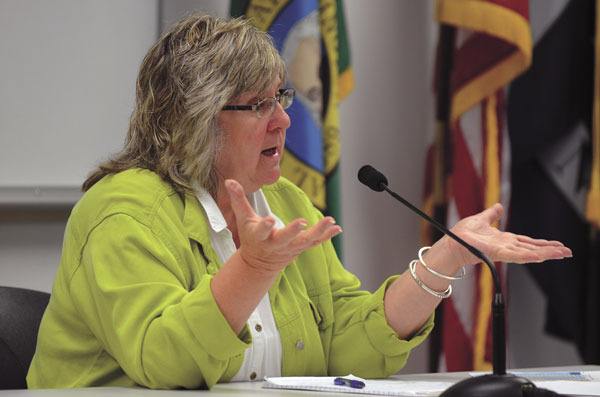The discussion is over.
The Island County Board of Commissioners Monday directed Human Services Chief Jackie Henderson to begin the process of replacing the troubled Island County Recovery Services with a private chemical dependency agency.
Henderson, who brazenly said last week she would refuse such an order, recanted that position.
“I’m trying to compromise, I’m trying to move on,” Henderson said.
THE COUNTY-RUN drug and alcohol center, a division of human services, came under fire for a pattern of errors and practices that are not in compliance with state law.
The center’s certification with the state is threatened, and Island County Prosecutor Greg Banks last week announced a moratorium on the acceptance of any new Drug Court clients until “there is a reliable and effective treatment provider for our participants.”
Drug Court officials urged the board to direct Henderson to seek proposals from other private agencies in the hopes of improving service.
THE BOARD proposed a reconciliation between recovery services and Drug Court officials this past Wednesday, but it appears now a truce was never possible.
In a letter submitted last week to the commissioners, Superior Court judges Alan Hancock and Vickie Churchill, Banks and Court Administrator Brooke Powell said the problems would not disappear.
“At this point, our confidence in (Recovery Services) is broken,” the letter said.
“We do not believe any negotiation, meeting, or memorandum of understanding will effectuate the necessary change for a competent treatment provider.”
IN RESPONSE to the letter, as well as an article published in Saturday’s Whidbey New-Times detailing the many problems at the embattled treatment center, Island County Board Chairwoman Kelly Emerson asked to revisit the issue Monday.
Emerson said she was “disappointed” by the decision last week.
Unless it can justify not acting immediately, Emerson said she believes the board has little choice but to immediately seek a new treatment provider.
“I cannot justify that it’s not in the best interest of the people to go out for the private-sector bids,” Emerson said. “It’s my belief that we should direct Jackie Henderson, the director of the human services department, to begin the RFP process.”
HENDERSON SAID her reasoning for not wanting to pursue the proposal-seeking process is the state budget is undecided and federal funding sources are uncertain.
“Drug Court wants the best possible provider, I want the best possible provide, I know you want the best possible provider,” Henderson said.
“I am willing to write the RFP of my life but we have to have good information.”
With no concrete answers, the outcome may be a fruitless search for an alternate treatment provider or ending up with an agency only to learn later that there is less money available to adequately fund the service.
“That’s a very real possibility,” she said
COMMISSIONER JILL Johnson, who suggested reconciliation last week, said she did so believing the relationship could be salvaged.
Since then, it’s become clear it cannot.
She likened the situation to a marriage she believed was on the rocks when, in fact, it’s damaged beyond repair.
“What we have here is a divorce,” she said.
“The hope that I had that we would be able to negotiate through this, mediate through this, ended a long time ago,” she added.
“The part that is disappointing for the three of us, I think, is that this problem reached us too late.”
COMMISSIONER Helen Price Johnson argued it is irresponsible to move forward as proposed with so many uncertainties.
She expressed concern for existing patients.
Only a small portion of the approximately 250 clients at recovery services are drug court participants.
The vast majority are relying on the provider now for help, she argued, and they shouldn’t be abandoned for problems with Drug Court.
“I don’t want the tail wagging the dog here,” Price Johnson said.
She questioned whether her colleagues did their due diligence and visited the treatment center in person before casting their support for such a measure.
The comment did not sway her fellow commissioners.
“I DON’T actually get offended very easily in this job but we may have just done it,” said Johnson, with a smile.
This was not about employees, she said, but about “report after report” from the state about performance failures.
It goes beyond the problems surrounding Drug Court, she said.
“What we as commissioners have to do now that we have this information is hold our programs and employees accountable for performance behaviors.”
Several versions of a motion to move forward were discussed.
Ultimately, the board voted 2-1, with Price Johnson opposed, to proceed immediately with the request for proposal process.



